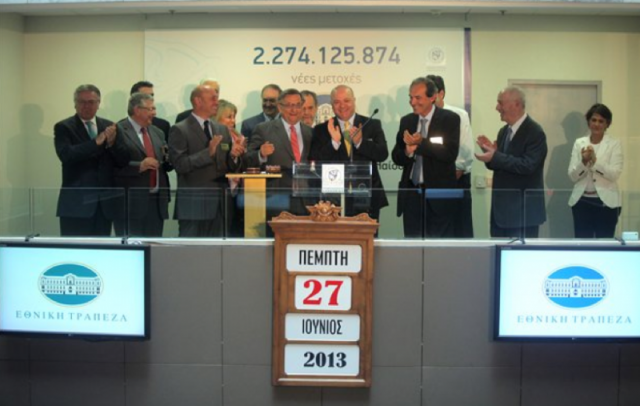Photo: newmoney.gr
Victoria Mindova
The National Bank of Greece has completed the recapitalization and emitted on Thursday new shares on the stock exchange. The influx of new shares and warrants has caused a decline in the Greek financial market but the managements of the surviving private banks have expressed satisfaction at having avoided nationalization. The only bank that has failed to raise capital from private investors, namely Eurobank, has entered a new phase of instability as the majority of the financiers in the country disagree with the selection of the new management of the bank, which has resulted in a 30% decline in its shares.
"My message is that today's event connected with the National Bank of Greece should make us a little more optimistic about the country's future," said George Zanias, president of the National Bank of Greece, on the day of emitting the bank’s new shares on the Athens Stock Exchange.
"We are entering a new period with the completion of the recapitalization of banks. Those of them which have already secured capital should dynamically contribute towards catalyzing economic  recovery. The country must meet not only its commitments but also complete the necessary changes and reforms, establishing in parallel a stable framework to attract direct investments to stimulate production and exports," Alexandros Tourkolias, executive manager of the National Bank of Greece, said prior to the opening of the Athens Stock Exchange.
recovery. The country must meet not only its commitments but also complete the necessary changes and reforms, establishing in parallel a stable framework to attract direct investments to stimulate production and exports," Alexandros Tourkolias, executive manager of the National Bank of Greece, said prior to the opening of the Athens Stock Exchange.
Eurobank’s tone is considerably more pessimistic. Representatives of the financial circles comment for To Vima newspaper that the appointment of Christos Megalou and George David to the management of Eurobank is the result of political pressures and external interests rather than of an objective assessment.
According to the same source, the new managing director Christos Megalou has been outside the financial field over the past two years and does not have a true notion of the needs of the bank. He has extensive experience in consulting and sales but has no experience in managing a financial institution.
George David, who has been appointed as a manager of the financial institution without executive functions, heads a company which has about 50 million euro in debts to Eurobank and his appointment to a managerial position constitutes a clear conflict of interest. Another popular opinion among the public is that the change of the former management of the bank is necessary because it is responsible for the poor financial condition of Eurobank.
The market had not responded well to the new appointments and to the resignations of Nikos Nanopoulos, Nikos Karamouzis and Virona Balis from the bank’s management body. On Wednesday, a day after the announcement of the new management staff, Eurobank’s shares lost 29% of their value. Financial experts note that the reshuffles in the management body are not effective and that the big bank clients are starting to turn, one by one, to other financial institutions.
Eurobank has become the property of the state Financial Stability Fund because it did not have time to prepare itself for the recapitalization. The majority of its shares (about 85%) had already been transferred to the National Bank of Greece, with which it had to be merged, but the deal has failed, making Eurobank the only bank bailed out by the state mechanism.
The selection of the new management is sending a signal to investors that the bank is going to be divided into a "good" and a "bad" part and according to the online portal euro2day.gr, the remaining part of the bank is going to be quickly sold which, according to experts, can be a dangerous experiment.
Meanwhile, the online edition of the New York Times draws particular attention to the programme for the issuance of warrants along with the new shares to recapitalize the banks. For each new share bought, the investors receive a package of warrants which entitles them to buy additional shares of the bank at a fixed price.
The deal allows the holders of warrants to cash in their shares every six months, the first opportunity being on 10 December.
Critics of the programme point out that the government is losing by giving away the warrants at a time when Greece is finding it difficult to raise funds in other ways.
"The market value today of all the Greek bank warrants is 1.7 billion euro," notes Spiros Pagratis, financial expert and a lecturer at the Athens University of Economics and Business. He states for the New York Times that this amount exceeds four times the amount that Greece will receive from the privatization of one of the strategic state companies, namely DESFA.
Pagratis forecasts that if the share price of the banks increased in value by 50%, the value of the warrants will climb to 7.9 billion euro.
The edition notes that the money of European taxpayers has saved the Greek banks from bankruptcy. On the other hand, the Greek taxpayers must repay in the following decades the 58 billion euro which Greece has obtained from the European Financial Stability Facility. At the same time, the vast majority of the owners and governors of local banks continue to hold their managerial positions without assuming responsibility for the poor management of banks in recent years.
The New York Times pays special attention to Piraeus Bank and its Executive Director Michalis Sallas who has recently sold his old stock worth 11 million euro and announced that he will buy new shares. If the information is correct, the banker should have received warrants to the amount of 2.5 million euro.